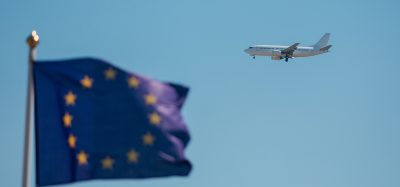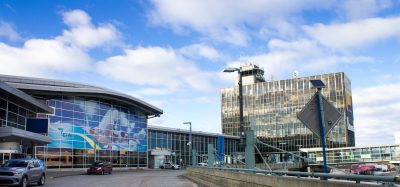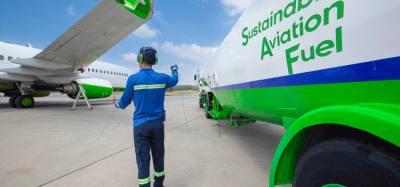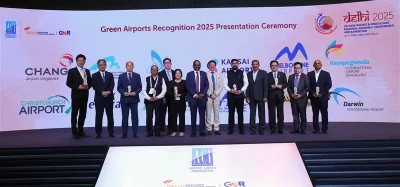Optimism, opportunity and an outlining of aviation’s importance for post-Brexit Britain
- Like
- Digg
- Del
- Tumblr
- VKontakte
- Buffer
- Love This
- Odnoklassniki
- Meneame
- Blogger
- Amazon
- Yahoo Mail
- Gmail
- AOL
- Newsvine
- HackerNews
- Evernote
- MySpace
- Mail.ru
- Viadeo
- Line
- Comments
- Yummly
- SMS
- Viber
- Telegram
- Subscribe
- Skype
- Facebook Messenger
- Kakao
- LiveJournal
- Yammer
- Edgar
- Fintel
- Mix
- Instapaper
- Copy Link
Posted: 23 November 2016 | Roy Manuell | No comments yet
After attending the AOA Annual Conference 2016, what have we learnt over the last 12 months in light of brexit and what does the future hold for the sector…?


It has not been a straightforward twelve months for the United Kingdom. Bracing itself for the unknown future that Brexit might bring following the referendum result in June, the nation is split; clouded with uncertainty and falling out fast with a Europe that too is facing crises of its own.
A turbulent year ahead?
International Airport Review was present at the Airport Operators Association Annual Conference and Awards 2016 in London where the UK airport and aviation elite congregated to review and discuss the ways in which the UK’s wider situation has affected the industry as well as to congratulate and bid farewell to CEO Darren Caplan after six years at the AOA’s helm.
It’s certainly been an exceptionally busy year for the UK sector – having to come to terms with Brexit as well as the build-up and final decision on the additional runway in London. While tinged with controversy as we have previously discussed with Steven and John’s respective analyses of the mega-hub question, there seemed to be a refreshed consensus at this year’s event.
As articulated by the Secretary of State for Transport, Chris Grayling: “It’s been a busy few months, but an important few months” as he spoke in light of the decision.
Gatwick CEO Stewart Wingate who led a widely-praised, passionate campaign was a beacon of graciousness as he took to the stage to congratulate Heathrow and the general tone set my Mr Wingate was one of a unified, complementary development of capacity and infrastructure to aid the UK as a whole to move forward.
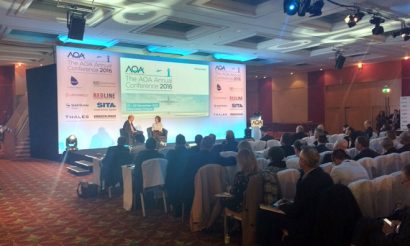

Secretary of State for Transport, MP Chris Grayling, interviewed by Natasha Kaplinsky
“I am disappointed but not despondent,” he admitted but called for a “galvanising effect” for the industry in the wake of the referendum result.
As Mr Wingate continued, it became evident the extent of the progress in terms of growth and development Gatwick has made in recent years to even push Heathrow so close, certainly in terms of the profile of its campaign; before he then stated that the airport aims to push for 45m passengers next year and expand its South East Asia routes – an incredibly ambitious approach, even for the world’s biggest single runway airport and the eight largest in Europe.
Echoed by the Secretary of State, the stress on airports other than Heathrow such as Stansted, Luton, London Southend (who took home the Airport of the Year in the under 3m passenger category later in the evening) has become ever clearer in light of Brexit. Further to this, when moderator Natasha Kaplinsky pressed Mr Grayling on whether the government would therefore also support an additional runway at Gatwick, the cabinet member’s response remained ambiguous – but far from a no.
Aside from this, the MP did state that what was important now for the country was to rally behind the decision and work together towards beginning the implementation process around this time next year. While facing much opposition, both legal and communitarian embodied by the resignation of the party whip by Zac Goldsmith earlier in the Autumn, Mr Grayling did go on to outline a “world leading” £2.6bn compensation package, labelling Heathrow the “right decision for the country” as crucial in developing international business and tourist connections. In essence, it became clear that the predicted economic impact Heathrow will have ultimately swung the decision in its favour.
“The stress on airports other than Heathrow has become ever clearer in light of Brexit…”
That said, it is thought by many that for the decision to finally be cleared, it will take far longer than a year and Tim Hawkins of Manchester Airports Group declared in the panel discussion, it may take 10-15 years for the runway to even be complete.
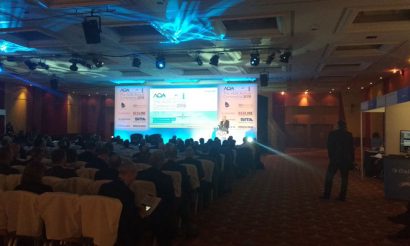

Ed Anderson, Chairman of the Airport Operators Association (AOA)
“It will be exhausting, but we must follow the formal process,” the Secretary of State for Transport continued, citing the fact that the freight capacity Heathrow offers as another reason for which the decision was made and one that his opposite number, the Shadow Secretary of State for Transport Andy McDonald shared, while expressing distinguished concern for the interests of the surrounding constituencies.
“We must take an international approach to our aviation policy and for this Heathrow was the correct decision,” Mr Grayling concluded.
That brings us onto Brexit
While air travel is inherently important to global trade and the conference certainly highlighted this, if Britain were to have to look far further afield under the guise of its separation from the EU, airports such as Gatwick and Heathrow would undeniably play a crucial role in this.
AOA CEO Darren Caplan led the calls for positivity in this respect, offering what might be a rallying cry in that “Brexit is ours to fight for”.
It might well be up to the aviation and airport industry in the UK whether or not it eventually enjoys what is becoming known as a ‘good Brexit’ and certainly there is a renewed belief as expressed by the speakers at the conference in the intrinsic value of aviation to the UK.
“We need to punch our weight… we are so valuable to this country,” said Andrew Haines of the CAA in a focus leadership panel.
Certainly this was echoed by the accent put on the importance of the sector by the Secretary of State and his opposition number on the conference’s opening day and indeed Darren Caplan later remarked: “I have never heard politicians speak so positively about us”.
If Britain were to have to look far further afield under the guise of its separation from the EU, airports such as Gatwick and Heathrow would undeniably play a crucial role in this…
With respect to what the future might hold for UK aviation and airport operations, the general tone set by Mr Caplan, the two politicians and many of the other speakers was that Brexit and the Heathrow expansion plans present an exciting opportunity for the global development of air travel network.
What goes up must come down
The impending reality check however, unsurprisingly came from a measured, European perspective.
Olivier Jankovec, Director General of ACI Europe was extremely succinct and precise when outlining the importance of air travel. The UK, an exaggerated microcosm of Europe in this respect, has seen unprecedented growth in passenger numbers over the past few years with the European annual passenger figures culminating in a grand total of 1.9bn for 2016 and respectively Mr Jankovec didn’t shy away from firstly describing how strong Europe has been in the sector before suggesting that the UK was its star pupil.
That said, he then went onto argue the fact that the dynamic behind the growth has been fundamentally rooted in the union itself offering 6.2% of passenger growth from the previous year versus -1.9% from those nations outside of the union.
Further to this, he alluded to talks that The Commission is beginning with ASEAN and the Middle East in light of the EU finally moving forward with a “coherent aviation strategy”.
Nevertheless, this happened before Brexit struck and now, while the direction remains the same, a “hard Brexit would weaken EU aviation strategy”.
ACI Europe in particular are worried about what Brexit might mean for the Open Skies policy and the result has certainly opened up a climate of determined uncertainty and worry for all involved.
“Brexit is ours to fight for…”
Mr Jankovec voiced what many in the room have feared since June in that the “the UK’s position has definitely weakened” following the referendum.
“The EU may listen politely to the UK, but it will no longer be able to shape and determine policy.”
While this remains to be seen, it is hard to disagree with Olivier Jankovec’s statement as indicative of the general European sentiment.
“The UK’s position has definitely weakened…”
“Brexit is indicative of a mega-trend,” Olivier continues and concludes: “I’m an optimist, but I’m worried.”
If ACI Europe were concerned about the state of a post-Brexit United Kingdom, Ryanair boss Michael O’Leary was running out of superlatives.
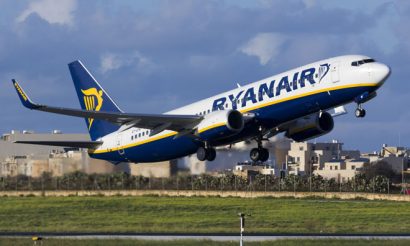

When discussing the previous political positivity with respect to its outlook of the UK aviation sector’s future, Mr O’Leary described their stance with words we are unable to use before describing airports as “bandits”.
“EU is finally moving forward with a “coherent aviation strategy…”
Lamenting the intelligence of those charged with negotiating the Brexit deal – “If they had any fewer IQ points they’d be akin to plant life” – he suggested that the electorate were “misled”, before finishing by analogising the Brexit decision and the UK’s post-Brexit approach to resembling “Dad’s Army going off to war.”
In other words, his stance was that the UK, in believing that there is a chance of maintaining access to the single market, which O’Leary described as being “one of the best things to emerge in my lifetime”, after leaving the European Union, has subjected itself to a completely delusional approach.
“If they had any fewer IQ points they’d be akin to plant life…”
“There is no direction, none of the politicians have any idea what they’re going to do. The UK is going to walk itself off a cliff within 2 years.”
As a result, Ryanair, he stated, have made moves and aim to “pivot away from the UK” in future and this Winter, the airline have already implemented measures to do so.
A unnecessary tax?
Unsurprisingly, Mr O’Leary didn’t hold back when describing the famously high UK Air Passenger Duty tax.
“It’s a disgrace,” he stated, suggesting that as part of the realignment of Ryanair’s strategy, the airline will look toward the continent where capacity is more open and competition remains weak.
He even went as far as to saying some flights could be free: “If APD is gone: at many airports I’m paying more than £20 already with APD and fees, if I start getting that back, why not? I’m doing seat sales this week at £4 and I’m paying the £13 APD – I’m paying you to fly with me.
“Instead of promotional tickets being £9 or £5 they will be free.”
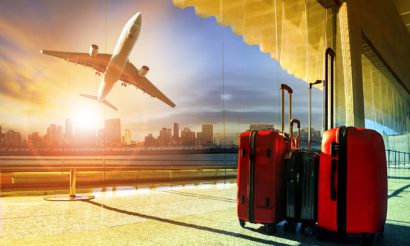

With many expecting a development to be made by the UK government on Air Passenger Duty tax in the Autumn statement later today and with Scotland campaigning for a 50% reduction, its existence is likely to change in the near future and certainly APD became one of the main talking points at the AOA’s annual conference. That said, when questioned on the issue, the Shadow Secretary of State for Transport Andy McDonald admitted that Labour’s policy on the issue is as “clear as mud” while Secretary for State Chris Grayling argued that he “very much doubted” that the Scots would be able to implement a 50% reduction.
A greener future
While Brexit and APD seemed to dominate proceedings, the prominence of sustainability and a renewed awareness in the industry for the environmental impact of air travel was refreshingly hard to miss at the event and Sustainable Aviation later picked up an award from the AOA.
Interestingly, while Gatwick and Stewart Wingate, long renowned for their environmental approach having reduced emissions by 33% since 1990 and aim to become the UK’s “most sustainable airport”, were very vocal about a sustainable approach, the speech given by Heathrow CEO John Holland-Kaye, was almost entirely dominated by the environment. Perhaps this is unsurprising given that a significant amount of opposition to expansion plans has confronted Heathrow’s environmental impact and in response Mr Holland-Kaye accentuated a welcome of ICAO’s carbon neutral climate change goals.
What have we learnt from the last year?
Despite the scepticism of Michael O’Leary and the uncertainty Brexit brings, the AOA Conference 2016 felt overwhelmingly full of positivity, both in terms of a renewed and healthy valuation of aviation as a means of connecting Britain to the world as well as a final (almost) conclusion to the expansion debate. Certainly, there are many issues and many more will emerge from Brexit, there is no doubt.
While vague statements from the Secretary of State for Transport suggesting that he wants to build “a transport system that works for all” and that of Heathrow CEO Holland-Kaye who wants the airport to become a “legacy for Britain” may feel like they belong on a marketing campaign than a manifesto for how to strengthen Britain’s international connectivity, to paraphrase the outgoing Darren Caplan of the AOA, if the UK wants, as a sector to make Brexit work, it might have to fight for it, but necessarily it has the infrastructure and European and Internationally-renowned status to do so.



